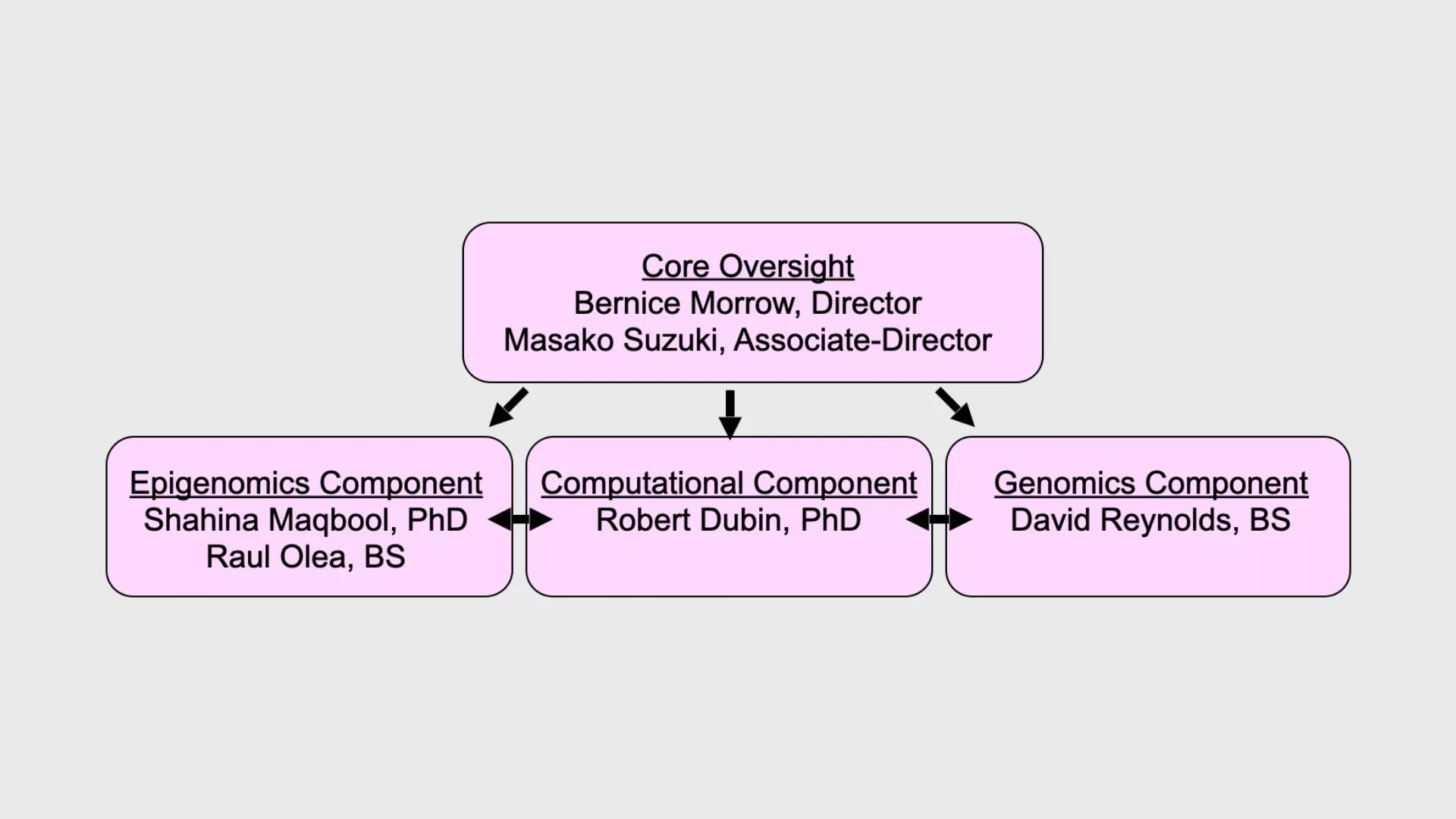Neurogenomics (NGEN) Core

NGEN Core Director:
Dr. John Greally, Scientific Director Epigenomics Shared Facility, Computational Genomics Facility, High Performance Computing Facility
NGEN Core Assistant Director:
Dr. Bernice Morrow, Scientific Director Genomics Shared Facility
Objectives
The pace of discovery afforded by technical advances in genomic technologies is unprecedented and allows insights into diseases and physiology that would have been unthinkable in even the recent past, in particular for IDD research. While microarray technology has been a mainstay of genomics for several years, the use of massively-parallel (next-generation) sequencing is now adding new dimensions that were not otherwise possible, for reasons of cost as well as type and quality of data generated. Insights into developmental disabilities can be gained through mutation detection (using techniques like exome sequencing) for inherited disorders, RNA and microRNA sequencing assays to identify transcriptional dysregulation and epigenomic assays to study the mechanisms underlying gene expression abnormalities.
However, there are challenges with the adoption of these technologies by the individual researcher. The platforms for massively-parallel sequencing are extremely expensive, the assays themselves are complex, and above all, the data management and analysis issues are almost insurmountable for most investigators. The purpose of this NGEN Core is to make it feasible for the researcher to overcome these hurdles, by handling everything from experimental design advice through sample processing to assay performance and data management and analysis. We describe here how we accomplish these goals currently and how we will provide dedicated services through the RFK IDDRC Neurogenomics Core to serve IDD research. We also describe the numerous investigators who are already taking advantage of this combined molecular and computational infrastructure to develop strong genomic and epigenomic components to their research programs.
The overriding goal of the NGEN Core is thus to continue to provide the most advanced genomics and epigenomics assays and analyses to support the neurological and neuroscience research goals as focused on IDD conditions at the RFK IDDRC. Modern neuroscience and neurology research has an increasing need for sophisticated genome-wide genetic and epigenetic assays in the quest to understand not only disease states but also the normal functioning of the nervous system. With the goals for the IDDRC encompassing areas such as the study of the pathogenesis of autism, the pathogenesis of neurogenetic disorders and the links between nutrition, obesity and brain development, deafness and communication disorders, both genetic and epigenetic influences are obvious potential factors that must be considered. A strong cutting-edge NGEN Core that supplies access to the most up-to-date sophisticated genomic technologies in a cost-effective and efficient manner is therefore an essential resource within a Center such as this. We will describe how we have assembled, integrated and extended resources across a system of existing Core facilities to serve the specific neurogenetic needs of the IDDRC community at Einstein, leveraging the investment of the IDDRC to provide a powerful integrated readily accessible Core facility that allows even the most inexperienced users to perform studies productively and successfully. The resources to be assembled are from multiple existing Core facilities at Einstein, all developed and run by the Department of Genetics and the Center for Epigenomics. The leadership for this Core is drawn from both of these entities, reflecting their commitment to the success of this Core within the IDDRC. Specifically, the NGEN Core seeks:
- To provide prioritized access to the most advanced epigenomic and genomic molecular assays
- To provide expert consultation with and training of IDDRC investigators performing these molecular assays
- To provide expert consultation on experimental approaches and design
- To maintain an advanced bioinformatic data analysis and management system
- To provide cost-reduced microgrants to promote pilot and feasibility studies
Resources/Services
The deliverable goal for the Neurogenomics Core Facility is to allow the investigator to take an interesting experimental question requiring genomic or epigenomic assays, get advice on how to approach the problem, have samples analyzed using powerful technologies and have analyses performed to generate a data set that can be integrated with phenotypic and imaging data.
Massively-parallel sequencing-based assays:
- Chromatin immunoprecipitation (ChIP) assays:
- ChIP-seq
- Cytosine methylation assays:
- Restriction enzyme-based (HELP-tagging)
- Restriction enzyme-based (HELP-tagging)
- Transcription assays:
- Directional transcriptome sequencing
- RNA-seq
- miRNA-seq
- Genomic sequencing assays:
- Whole genome sequencing
- Targeted sequencing using capture techniques
- De novo sequencing and assembly
Other genomics assays:
- SEQUENCING, Traditional: Plasmid and PCR product sequencing
- MICROARRAYS: Gene expression, Exon, SNP and CNV arrays (Affymetrix)
- DNA PURIFICATION: Plasmid and PCR product purification
- FRAGMENT ANALYSIS: High-resolution fluorescent electrophoresis
- PYROSEQUENCING: SNP typing and CpG methylation
- SEQUENOM: SNP typing, CpG methylation, Gene expression
- REAL-TIME PCR: SYBR green and TaqMan assays
- BIOANALYZER: RNA QC
Einstein is an active member of the New York Genome Center (NYGC) which is an independent, nonprofit genome sequencing center and consortium of medical and research centers based in New York City. In addition to Einstein, its consortium members include Cold Spring Harbor, Columbia, Weill Cornell, Sloan Kettering, Mount Sinai, Rockefeller and other prominent institutions in the NY area. Einstein is leading the development of epigenomics assay services at this center, including a new service allowing whole genome bisulphite sequencing using the Illumina X Ten technology, which allows cost-effective whole genome sequencing for the first time. Whole genome sequencing allows both for the coding genes as well as noncoding, putative regulatory regions that are critical for understanding the basis of human disease. The NGEN will provide intellectual support to help interpret such complex regions in the genome. We anticipate migrating towards the use of powerful NYGC sequencing technologies over time, thereby gaining further cost efficiencies due to higher throughput and likely improved data quality.
Who to Contact
General Core Information & Epigenomics
John M. Greally, M.B., Ph.D.
Operations Director
Shahina B. Maqbool, Ph.D.
Genomics Scientific Director
Bernice Morrow, Ph.D.
Operations Director
David Reynolds
